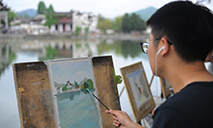Cries for survival, justice -- overseas human rights survey (Part II)
LONDON, Dec. 13 (Xinhua) -- Living a life of contentment is the ultimate human right. According to a recent survey on overseas human rights conducted by Xinhua News Agency, nearly 70 percent of the respondents have a consensus that a sense of gain, security and happiness of the ordinary people is an important indicator of a country's human rights situation.
However, for many, primary basic human rights, namely the rights to subsistence and development, are still out of reach because of the West's intervention, while for some others, happiness is also a luxury.
CRY FOR JUSTICE
Standing downstairs in an apartment building in London, England, Nabil Choucair tried several times to rush into the building, but failed. He watched the fire engulfing the whole building, and also his mother, sister, brother-in-law and three nieces.
This scene in the early morning of June 14, 2017 is painful for the middle-aged Choucair. The world-shattering Grenfell Tower fire in London, which killed more than 70 people, also devoured Choucair's hope for social justice.
More than four years later, he still habitually picks up the phone to call his mother and brother-in-law.
"Every day ... I always see it (the fire) in my mind," he said, holding his phone. Choucair teared up as he showed reporters photos of his relatives that had passed away.
The fire made many people like Choucair become families of the victims. More than 200 surviving families are also displaced.
However, the fire could have been avoided.
Many reports and documents on the fire showed that the cause of the fire was an electrical short-circuit of a refrigerator on the fourth floor. However, flammable materials installed on the outside of the building contributed to the rapid spread of the fire and destroyed the entire 24-storey building, resulting in the worst residential fire in Britain since World War II.
According to many investigative documents, the building had undergone a major renovation before the fire, with a "deadly external cladding" attached to make the decades-old tenement building "look better."
Choucair said the building's problems were endless, the electrical circuits were chaotic and residents repeatedly complained about safety issues to authorities, which were only "fixed" with minor repairs and perfunctory work.
"They were not looked at or even listened to," Choucair said, pointing his finger in the direction of the building. "And this is why Grenfell happened."
Why are residents' voices ignored? According to investigations, many of the hundreds of residents in this building are immigrants and ethnic minorities such as Africans and Arabs.
They're just outsiders and minorities, and they were just literally discriminated against, Choucair believed.
Racial discrimination drowned out Grenfell residents' cries for help.
In 2018, the British government was criticized for mistreating the "Windrush generation" of immigrants. From 1948 to 1971, immigrants from the Caribbean arrived in Britain on the ship MV Empire Windrush, which filled the labor gap in Britain after World War II. Now, they are not only coldly treated in medical care, renting and employment matters, but some even receive threats of deportation.
According to End the Virus of Racism, a UK-based campaign group, Britain's East and Southeast Asian communities have seen a 300-percent increase in hate crimes since COVID-19 pandemic broke out. Other official figures show that black people are four times more likely than white people to be violently abused by the police in London.
Discrimination and violence against ethnic minorities are rooted in Anglo-Saxon culture, and "white supremacy" has transformed into a comprehensive, persistent and systemic social problem that is tearing apart Britain as well as America across the ocean.
In the wake of the Grenfell Tower fire, there was anger among the black community in Britain over the lack of a proper settlement for residents in the building. In Choucair's view, the saying "all men are created equal" has long been a "true lie."
"A TALE OF TWO BRITAINS"
Built in 1974, the Grenfell Apartment block is located in the Royal Borough of Kensington and Chelsea, west London. In Choucair's view, this is a "wrong position."
In London, "Kensington" is synonymous with wealthy areas, but that is not the whole picture. Over the years, the region has been marked by a rich south and a poor north. In the north, there are many hastily erected, shabby towers and "public housing" like Grenfell Tower, which are in dilapidated surroundings. To the south are large, comfortable single-family villas surrounded by tidy gardens and luxury shops.
Just across the wall from Grenfell is an expensive private school. Just a 10-minute walk south, the building is home to billionaires and celebrities from around the world. Between north and south, just half a mile apart, the wealth gap will never be bridged.
The international aid group Oxford Committee for Famine Relief (OXFAM) published a report in 2014 called "A Tale of Two Britains: Inequality in the UK." Figures at the time showed that the five richest families had a combined wealth of 28.2 billion pounds (about 37.2 billion U.S. dollars), 100 million pounds (about 132 million dollars) more than the bottom 20 percent of the population.
It also showed that since the mid-1990s, the incomes of the top 0.1 percent have grown almost four times faster than the incomes of the bottom 90 percent of the population.
The polarization of the rich and the poor, interwoven with racial discrimination, has been eroding fairness and justice in Western developed countries such as Britain and the United States.
This Thanksgiving, the United States also staged "A Tale of Two Britains" -- as wealthy Americans post photos of leisure trips to luxury resorts, many Americans are unable to enjoy a holiday due to falling incomes and rising debt.
According to a report by the American Economic Policy Institute at the end of 2020, the income gap between the tiny minority and the vast majority in the United States has widened over the past 40 years. From 1979 to 2019, 1 percent of the population saw their wages increase by 160 percent, while the remaining 90 percent saw their wages increase by just 26 percent.
"A house divided against itself cannot stand," Nobel Prize-winning economist Joseph Stiglitz quoted former U.S. President Abraham Lincoln as saying, which aptly summarized the current situation in the United States.
HAPPINESS IS A LUXURY
For Choucair, happiness and hope are further away. "Every day is a sad working day," Choucair said, in a choked voice.
He has been endeavoring to get justice and change laws to prevent others from going through what he has gone through. But his hard work has only encountered the gloomy reality.
For more than four years, the Grenfell Tower inquiry has progressed slowly, and the results of the second phase of the investigation have not yet been released. What is even more disappointing is that up till now, no one has been arrested because of the fire, and no enterprise has been held accountable.
Actually, after a preliminary investigation, the British police once announced that they had "reasonable grounds" to suspect the Kensington council and the district's tenant management organization committed "corporate manslaughter." However, British prosecutors said that no enforcement action will be taken until the results of the second-phase investigation are published.
This year, Choucair initiated a public petition on the website of the British parliament, calling for an inquiry into the role of institutional discrimination in the Grenfell Tower fire. By doing so, he hopes to draw the attention of the public and the authorities to racial discrimination.
However, his petition has received some 500 signatures, far from the 10,000 signatures needed for a possible parliament debate on the issue.
The fire reflects the problems of British democracy: the government has failed to listen to the people, and when the people are suffering and needing help, the government is inaccessible.
The growing gap between the rich and poor and different classes have created strong social dissatisfaction, which has been very obvious in the "Occupy Wall Street" movement and the "I Can't Breathe" protests.
In countries with American-style democracy, "one person, one vote" has long been replaced by "one dollar, one vote." The so-called "democratic government" is not the defender of the interests of the majority of voters, but those with money. Capital is the master of society.
When asked to rate the happiness of his life from 0 to 10, Choucair, born and raised in London, said "if I had to put a number, it would be in the minus."
Photos
Related Stories
Copyright © 2021 People's Daily Online. All Rights Reserved.










